美国名校毕业典礼演讲
- 格式:doc
- 大小:37.50 KB
- 文档页数:6
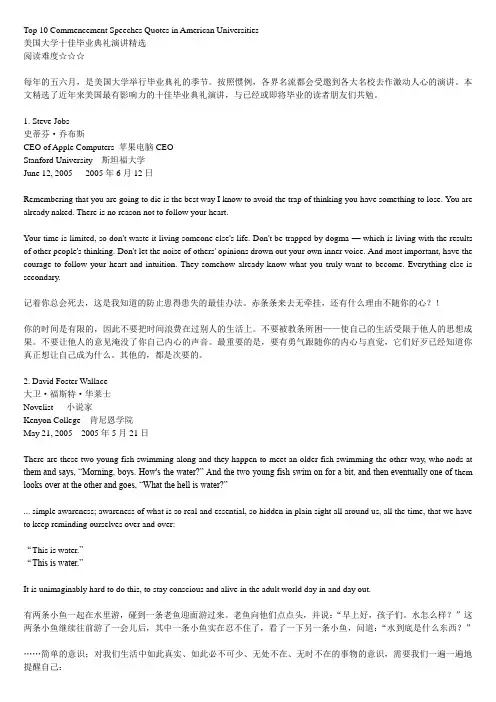
Top 10 Commencement Speeches Quotes in American Universities美国大学十佳毕业典礼演讲精选阅读难度☆☆☆每年的五六月,是美国大学举行毕业典礼的季节。
按照惯例,各界名流都会受邀到各大名校去作激动人心的演讲。
本文精选了近年来美国最有影响力的十佳毕业典礼演讲,与已经或即将毕业的读者朋友们共勉。
1. Steve Jobs史蒂芬·乔布斯CEO of Apple Computers 苹果电脑CEOStanford University 斯坦福大学June 12, 2005 2005年6月12日Remembering that you are going to die is the best way I know to avoid the trap of thinking you have something to lose. Y ou are already naked. There is no reason not to follow your heart.Y our time is limited, so don't waste it living someone else's life. Don't be trapped by dogma — which is living with the results of other people's thinking. Don't let the noise of others' opinions drown out your own inner voice. And most important, have the courage to follow your heart and intuition. They somehow already know what you truly want to become. Everything else is secondary.记着你总会死去,这是我知道的防止患得患失的最佳办法。
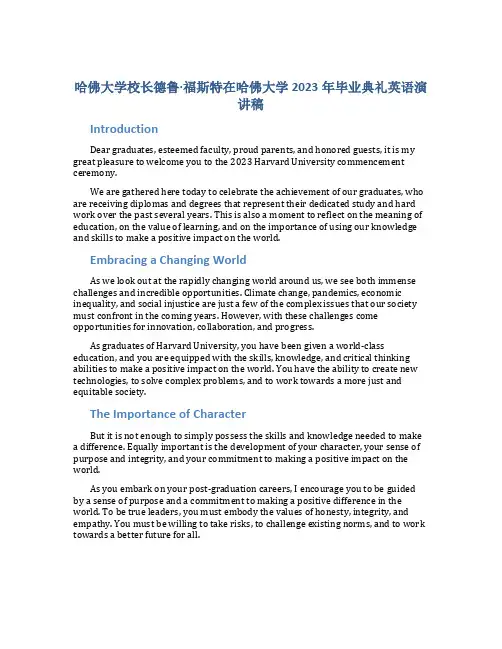
哈佛大学校长德鲁·福斯特在哈佛大学2023年毕业典礼英语演讲稿IntroductionDear graduates, esteemed faculty, proud parents, and honored guests, it is my great pleasure to welcome you to the 2023 Harvard University commencement ceremony.We are gathered here today to celebrate the achievement of our graduates, who are receiving diplomas and degrees that represent their dedicated study and hard work over the past several years. This is also a moment to reflect on the meaning of education, on the value of learning, and on the importance of using our knowledge and skills to make a positive impact on the world.Embracing a Changing WorldAs we look out at the rapidly changing world around us, we see both immense challenges and incredible opportunities. Climate change, pandemics, economic inequality, and social injustice are just a few of the complex issues that our society must confront in the coming years. However, with these challenges come opportunities for innovation, collaboration, and progress.As graduates of Harvard University, you have been given a world-class education, and you are equipped with the skills, knowledge, and critical thinking abilities to make a positive impact on the world. You have the ability to create new technologies, to solve complex problems, and to work towards a more just and equitable society.The Importance of CharacterBut it is not enough to simply possess the skills and knowledge needed to make a difference. Equally important is the development of your character, your sense of purpose and integrity, and your commitment to making a positive impact on the world.As you embark on your post-graduation careers, I encourage you to be guided by a sense of purpose and a commitment to making a positive difference in the world. To be true leaders, you must embody the values of honesty, integrity, and empathy. You must be willing to take risks, to challenge existing norms, and to work towards a better future for all.Closing ThoughtsAs you leave Harvard University today, know that you are part of a long and proud tradition of scholarship, innovation, and leadership. You are part of a community of exceptional individuals who share a commitment to making a positive impact on the world.I wish you all the best as you begin the next chapter of your lives, and I encourage you to embrace the challenges that lie ahead, to remain guided by your sense of purpose, and to always use your education and skills to make a meaningful and positive impact on the world.Congratulations, Class of 2023!。
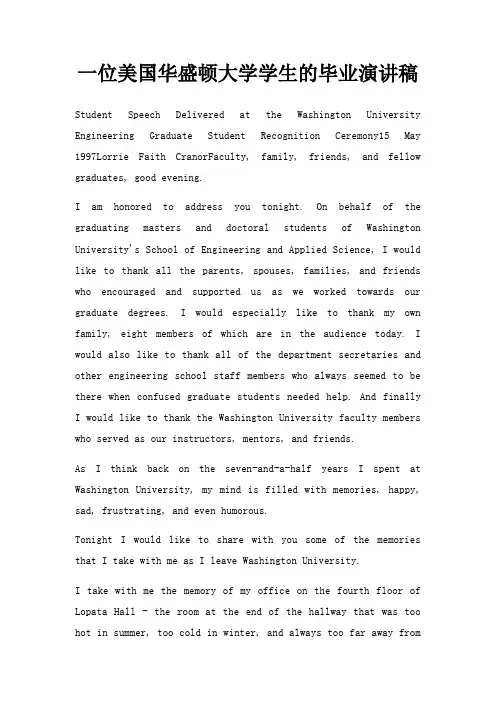
一位美国华盛顿大学学生的毕业演讲稿Student Speech Delivered at the Washington University Engineering Graduate Student Recognition Ceremony15 May 1997Lorrie Faith CranorFaculty, family, friends, and fellow graduates, good evening.I am honored to address you tonight. On behalf of the graduating masters and doctoral students of Washington University's School of Engineering and Applied Science, I would like to thank all the parents, spouses, families, and friends who encouraged and supported us as we worked towards our graduate degrees. I would especially like to thank my own family, eight members of which are in the audience today. I would also like to thank all of the department secretaries and other engineering school staff members who always seemed to be there when confused graduate students needed help. And finally I would like to thank the Washington University faculty members who served as our instructors, mentors, and friends.As I think back on the seven-and-a-half years I spent at Washington University, my mind is filled with memories, happy, sad, frustrating, and even humorous.Tonight I would like to share with you some of the memories that I take with me as I leave Washington University.I take with me the memory of my office on the fourth floor of Lopata Hall - the room at the end of the hallway that was too hot in summer, too cold in winter, and always too far away fromthe women's restroom. The window was my office's best feature. Were it not for the physics building across the way, it would have afforded me a clear view of the arch. But instead I got a view of the roof of the physics building. I also had a view of one corner of the roof of Urbauer Hall, which seemed to be a favorite perch for various species of birds who alternately won perching rights for several weeks at a time. And I had a nice view of the physics courtyard, noteworthy as a good place for watching people run their dogs. It's amazing how fascinating these views became the longer I worked on mmy dissertation. But my favorite view was of a nearby oak tree. From my fourth-floor vantage point I had a rather intimate view of the tree and the various birds and squirrels that inhabit it. Occasionally a bird would land on my window sill, which usually had the effect of startling both of us.I take with me the memory of two young professors who passed away while I was a graduate student. Anne Johnstone, the only female professor from whom I took a course in the engineering school, and Bob Durr, a political science professor and a member of my dissertation committee, both lost brave battles with cancer. I remember them fondly.I take with me the memory of failing the first exam in one of the first engineering courses I took as an undergraduate. I remember thinking the course was just too hard for me and that I would never be able to pass it. So I went to talk to the professor, ready to drop the ClAsS. And he told me not to giveup, he told me I could succeed in his ClAsS. For reasons that seemed completely ludicrous at the time, he said he had faith in me. And after that my grades in the ClAsS slowly improved, and I ended the semester with an A on the final exam. I remember how motivational it was to know that someone believed in me.I take with me memories of the midwestern friendliness that so surprised me when I arrived in St. Louis 8 years ago. Since moving to New Jersey, I am sad to say, nobody has asked me where I went to high school.I take with me the memory of the short-lived computer science graduate student social committee lunches. The idea was that groups of CS grad students were supposed to take turns cooking a monthly lunch. But after one grad student prepared a pot of chicken that poisoned almost the entire CS grad student population and one unlucky faculty member in one fell swoop, there wasn't much enthusiasm for having more lunches.I take with me the memory of a more successful graduate student effort, the establishment of the Association of Graduate Engineering Students, known as AGES. Started by a handful of engineering graduate students because we needed a way to elect representatives to a campus-wide graduate student government, AGES soon grew into an organization that now sponsors a wide variety of activities and has been instrumental in addressing a number of engineering graduate student concerns.I take with me the memory of an Engineering and Policy department that once had flourishing programs for full-time undergraduate, masters, and doctoral students.I take with me memories of the 1992 U.S. Presidential debate. Eager to get involved in all the excitement I volunteered to help wherever needed. I remember spending several days in the makeshift debate HQ giving out-of-town reporters directions to the athletic complex. I remember being thrilled to get assigned the job of collecting film from the photographers in the debate hall during the debate. And I remember the disappointment of drawing the shortest straw among the student volunteers and being the one who had to take the film out of the debate hall and down to the dark room five minutes into the debate - with no chance to re-enter the debate hall after I left.I take with me memories of university holidays which never seemed to apply to graduate students. I remember spending many a fall break and President's Day holiday with my fellow grad students in all day meetings brought to us by the computer science department.I take with me memories of exams that seemed designed more to test endurance and perseverance than mastery of the subject matter. I managed to escape taking any ClAsSes that featured infamous 24-hour-take-home exams, but remember the suffering of my less fortunate colleagues. And what doctoral student could forget the pain and suffering one must endure to survive the qualifying exams?I take with me the memory of the seven-minute rule, which always seemed to be an acceptable excuse for being ten minutes late for anything on campus, but which doesn't seem to apply anywhere else I go.I take with me the memory of Friday afternoon ACM happy hours, known not for kegs of beer, but rather bowls of rainbow sherbet punch. Over the several years that I attended these happy hours they enjoyed varying degrees of popularity, often proportional to the quality and quantity of the accompanying refreshments - but there was always the rainbow sherbert punch. I take with me memories of purple parking permits, the West Campus shuttle, checking my pendaflex, over-due library books, trying to print from cec, lunches on Delmar, friends who slept in their offices, miniature golf in Lopata Hall, The Greenway Talk, division III basketball, and trying to convince Dean Russel that yet another engineering school rule should be changed.Finally, I would like to conclude, not with a memory, but with some advice. What would a graduation speech be without a little advice, right? Anyway, this advice comes in the form of a verse delivered to the 1977 graduating ClAsS of Lake Forest College by Theodore Seuss Geisel, better known to the world as Dr. Seuss - Here's how it goes:My uncle ordered popoversmust spit out the air!"And . . .as you partake of the world's bill of fare,that's darned good advice to follow.Do a lot of spitting out the hot air.And be careful what you swallow.Thank you.学生毕业庆典演讲稿每年这时候,我们校园里都纠缠着留恋:睡在你上铺或下铺的兄弟同学,暗恋了数年的某个同学,“文泉”或“文澜”,“必逃的选修课和选逃的必修课”,对了,还有严老师,以及那已成为你青春之象征的钟塔。
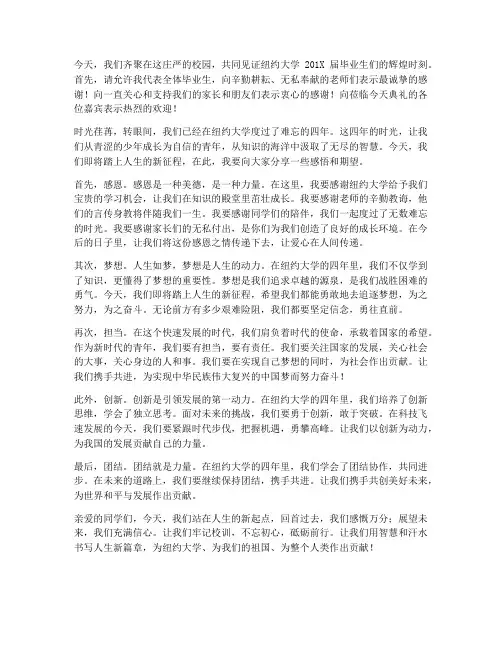
今天,我们齐聚在这庄严的校园,共同见证纽约大学201X届毕业生们的辉煌时刻。
首先,请允许我代表全体毕业生,向辛勤耕耘、无私奉献的老师们表示最诚挚的感谢!向一直关心和支持我们的家长和朋友们表示衷心的感谢!向莅临今天典礼的各位嘉宾表示热烈的欢迎!时光荏苒,转眼间,我们已经在纽约大学度过了难忘的四年。
这四年的时光,让我们从青涩的少年成长为自信的青年,从知识的海洋中汲取了无尽的智慧。
今天,我们即将踏上人生的新征程,在此,我要向大家分享一些感悟和期望。
首先,感恩。
感恩是一种美德,是一种力量。
在这里,我要感谢纽约大学给予我们宝贵的学习机会,让我们在知识的殿堂里茁壮成长。
我要感谢老师的辛勤教诲,他们的言传身教将伴随我们一生。
我要感谢同学们的陪伴,我们一起度过了无数难忘的时光。
我要感谢家长们的无私付出,是你们为我们创造了良好的成长环境。
在今后的日子里,让我们将这份感恩之情传递下去,让爱心在人间传递。
其次,梦想。
人生如梦,梦想是人生的动力。
在纽约大学的四年里,我们不仅学到了知识,更懂得了梦想的重要性。
梦想是我们追求卓越的源泉,是我们战胜困难的勇气。
今天,我们即将踏上人生的新征程,希望我们都能勇敢地去追逐梦想,为之努力,为之奋斗。
无论前方有多少艰难险阻,我们都要坚定信念,勇往直前。
再次,担当。
在这个快速发展的时代,我们肩负着时代的使命,承载着国家的希望。
作为新时代的青年,我们要有担当,要有责任。
我们要关注国家的发展,关心社会的大事,关心身边的人和事。
我们要在实现自己梦想的同时,为社会作出贡献。
让我们携手共进,为实现中华民族伟大复兴的中国梦而努力奋斗!此外,创新。
创新是引领发展的第一动力。
在纽约大学的四年里,我们培养了创新思维,学会了独立思考。
面对未来的挑战,我们要勇于创新,敢于突破。
在科技飞速发展的今天,我们要紧跟时代步伐,把握机遇,勇攀高峰。
让我们以创新为动力,为我国的发展贡献自己的力量。
最后,团结。
团结就是力量。
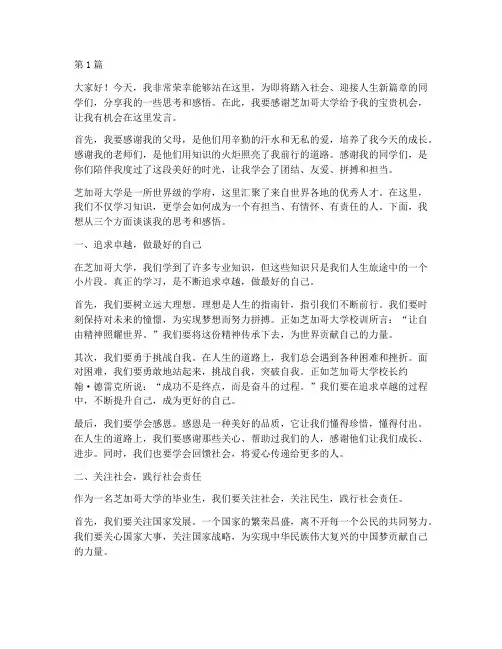
第1篇大家好!今天,我非常荣幸能够站在这里,为即将踏入社会、迎接人生新篇章的同学们,分享我的一些思考和感悟。
在此,我要感谢芝加哥大学给予我的宝贵机会,让我有机会在这里发言。
首先,我要感谢我的父母,是他们用辛勤的汗水和无私的爱,培养了我今天的成长。
感谢我的老师们,是他们用知识的火炬照亮了我前行的道路。
感谢我的同学们,是你们陪伴我度过了这段美好的时光,让我学会了团结、友爱、拼搏和担当。
芝加哥大学是一所世界级的学府,这里汇聚了来自世界各地的优秀人才。
在这里,我们不仅学习知识,更学会如何成为一个有担当、有情怀、有责任的人。
下面,我想从三个方面谈谈我的思考和感悟。
一、追求卓越,做最好的自己在芝加哥大学,我们学到了许多专业知识,但这些知识只是我们人生旅途中的一个小片段。
真正的学习,是不断追求卓越,做最好的自己。
首先,我们要树立远大理想。
理想是人生的指南针,指引我们不断前行。
我们要时刻保持对未来的憧憬,为实现梦想而努力拼搏。
正如芝加哥大学校训所言:“让自由精神照耀世界。
”我们要将这份精神传承下去,为世界贡献自己的力量。
其次,我们要勇于挑战自我。
在人生的道路上,我们总会遇到各种困难和挫折。
面对困难,我们要勇敢地站起来,挑战自我,突破自我。
正如芝加哥大学校长约翰·德雷克所说:“成功不是终点,而是奋斗的过程。
”我们要在追求卓越的过程中,不断提升自己,成为更好的自己。
最后,我们要学会感恩。
感恩是一种美好的品质,它让我们懂得珍惜,懂得付出。
在人生的道路上,我们要感谢那些关心、帮助过我们的人,感谢他们让我们成长、进步。
同时,我们也要学会回馈社会,将爱心传递给更多的人。
二、关注社会,践行社会责任作为一名芝加哥大学的毕业生,我们要关注社会,关注民生,践行社会责任。
首先,我们要关注国家发展。
一个国家的繁荣昌盛,离不开每一个公民的共同努力。
我们要关心国家大事,关注国家战略,为实现中华民族伟大复兴的中国梦贡献自己的力量。
![比尔·盖茨在哈佛大学毕业典礼上的演讲(中英文对照)[精选5篇]](https://uimg.taocdn.com/bfeec3f05122aaea998fcc22bcd126fff7055ddb.webp)
比尔·盖茨在哈佛大学毕业典礼上的演讲(中英文对照)[精选5篇]第一篇:比尔·盖茨在哈佛大学毕业典礼上的演讲(中英文对照) 比尔·盖茨和夫人梅琳达·盖茨在斯坦福大学2014年毕业典礼上的演讲。
整个演讲以“乐观”为主线,强调了他们对科技的乐观态度,以及对世界美好未来的乐观态度。
盖茨夫妇轮流讲述了自己的亲身经历和故事,告诉学生应该站在他人的立场上,感同身受那些处境不及自己的人,尽自己所能去帮助那些需要帮助的人,让全世界所有人类同胞都有一样的美好未来。
Stanford University.(斯坦福大学)BILL GATES: Congratulations, class of 2014!比尔·盖茨:2014届毕业生,祝贺你们顺利毕业(Cheers).(欢呼)Melinda and I are excited to be here.It would be a thrill for anyone to be invited to speak at a Stanford commencement, but it's especially gratifying for us.Stanford is rapidly becoming the favorite university for members of our family, and it's long been a favorite university for Microsoft and our foundation.我和梅琳达怀着激动的心情与你们欢聚在此共贺毕业。
能受邀到斯坦福大学学位授予典礼上做演讲是一件让人激动的事,对我们而言,这尤为荣幸。
斯坦福大学正日渐成为我们家庭成员最喜爱的大学。
而长久以来,斯坦福也是微软以及比尔与梅琳达基金会最喜爱的一所大学。
”Our formula has been to get the smartest, most creative people working on the most important problems.It turns out that a disproportionate number of those people are at Stanford.(Cheers).我们一直致力于让最聪颖有创造力的人攻克最为重要的问题。
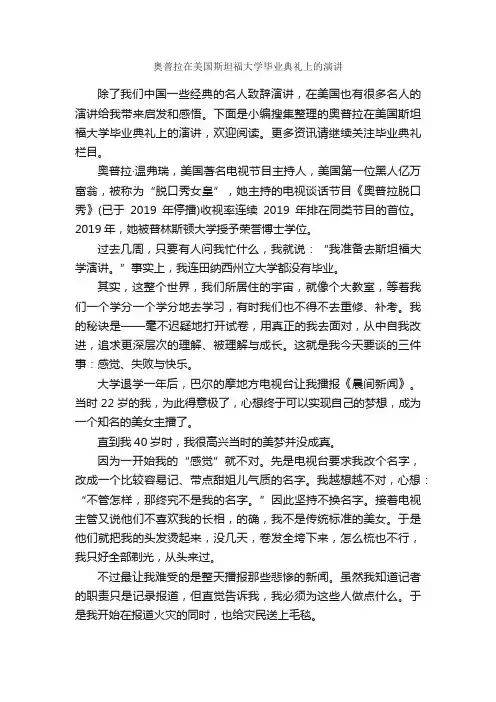
奥普拉在美国斯坦福大学毕业典礼上的演讲除了我们中国一些经典的名人致辞演讲,在美国也有很多名人的演讲给我带来启发和感悟。
下面是小编搜集整理的奥普拉在美国斯坦福大学毕业典礼上的演讲,欢迎阅读。
更多资讯请继续关注毕业典礼栏目。
奥普拉·温弗瑞,美国著名电视节目主持人,美国第一位黑人亿万富翁,被称为“脱口秀女皇”,她主持的电视谈话节目《奥普拉脱口秀》(已于2019年停播)收视率连续2019年排在同类节目的首位。
2019年,她被普林斯顿大学授予荣誉博士学位。
过去几周,只要有人问我忙什么,我就说:“我准备去斯坦福大学演讲。
”事实上,我连田纳西州立大学都没有毕业。
其实,这整个世界,我们所居住的宇宙,就像个大教室,等着我们一个学分一个学分地去学习,有时我们也不得不去重修、补考。
我的秘诀是——毫不迟疑地打开试卷,用真正的我去面对,从中自我改进,追求更深层次的理解、被理解与成长。
这就是我今天要谈的三件事:感觉、失败与快乐。
大学退学一年后,巴尔的摩地方电视台让我播报《晨间新闻》。
当时22岁的我,为此得意极了,心想终于可以实现自己的梦想,成为一个知名的美女主播了。
直到我40岁时,我很高兴当时的美梦并没成真。
因为一开始我的“感觉”就不对。
先是电视台要求我改个名字,改成一个比较容易记、带点甜姐儿气质的名字。
我越想越不对,心想:“不管怎样,那终究不是我的名字。
”因此坚持不换名字。
接着电视主管又说他们不喜欢我的长相,的确,我不是传统标准的美女。
于是他们就把我的头发烫起来,没几天,卷发全垮下来,怎么梳也不行,我只好全部剃光,从头来过。
不过最让我难受的是整天播报那些悲惨的新闻。
虽然我知道记者的职责只是记录报道,但直觉告诉我,我必须为这些人做点什么。
于是我开始在报道火灾的同时,也给灾民送上毛毯。
8个月后,我被新闻台开除了,但受制于我们签的合约,他们把我转去主持一个谈话节目。
我一上场,立刻感觉这才是我真正要做的。
我发现电视不只是娱乐,也能帮助人。
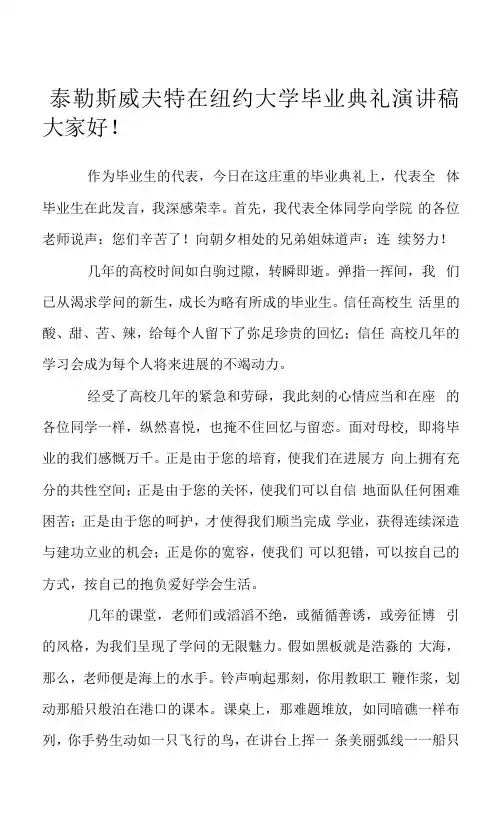
泰勒斯威夫特在纽约大学毕业典礼演讲稿大家好!作为毕业生的代表,今日在这庄重的毕业典礼上,代表全体毕业生在此发言,我深感荣幸。
首先,我代表全体同学向学院的各位老师说声:您们辛苦了!向朝夕相处的兄弟姐妹道声:连续努力!几年的高校时间如白驹过隙,转瞬即逝。
弹指一挥间,我们已从渴求学问的新生,成长为略有所成的毕业生。
信任高校生活里的酸、甜、苦、辣,给每个人留下了弥足珍贵的回忆;信任高校几年的学习会成为每个人将来进展的不竭动力。
经受了高校几年的紧急和劳碌,我此刻的心情应当和在座的各位同学一样,纵然喜悦,也掩不住回忆与留恋。
面对母校, 即将毕业的我们感慨万千。
正是由于您的培育,使我们在进展方向上拥有充分的共性空间;正是由于您的关怀,使我们可以自信地面队任何困难困苦;正是由于您的呵护,才使得我们顺当完成学业,获得连续深造与建功立业的机会;正是你的宽容,使我们可以犯错,可以按自己的方式,按自己的抱负爱好学会生活。
几年的课堂,老师们或滔滔不绝,或循循善诱,或旁征博引的风格,为我们呈现了学问的无限魅力。
假如黑板就是浩淼的大海,那么,老师便是海上的水手。
铃声响起那刻,你用教职工鞭作浆,划动那船只般泊在港口的课本。
课桌上,那难题堆放, 如同暗礁一样布列,你手势生动如一只飞行的鸟,在讲台上挥一条美丽弧线一一船只穿过……天空飘不来一片云,如同你亮堂堂的心,一派高远。
或许还有一些圆满吧,那么多精彩的讲座,我们已经来不及倾听;那么多精彩的活动,我们已经来不及参加。
或许还有一些愧疚吧,面对慈父严母般的老师,我们总能杜撰出各种逃课的理由。
面对仔细批改作业的各科老师,我们许多时候都只能拿出一个版本。
这几年的高校生活里,我们收获了太多,也错过了太多,而时间从未像现在这样吝啬,连一分一秒也不愿多留给我们。
我们总以为自己已经长大,总以为自己可以毫不在乎,但当离别就这样不依不饶地到来的时候,才觉察自己与这个集体已经血脉相连,荣辱与共了。
最近,我经常考虑一个问题:假如我可以再度过一次高校生活,又会选择怎样的生活方式?会努力地追求些什么?放弃些什么?有些问题真的会有和当时不一样的答案。
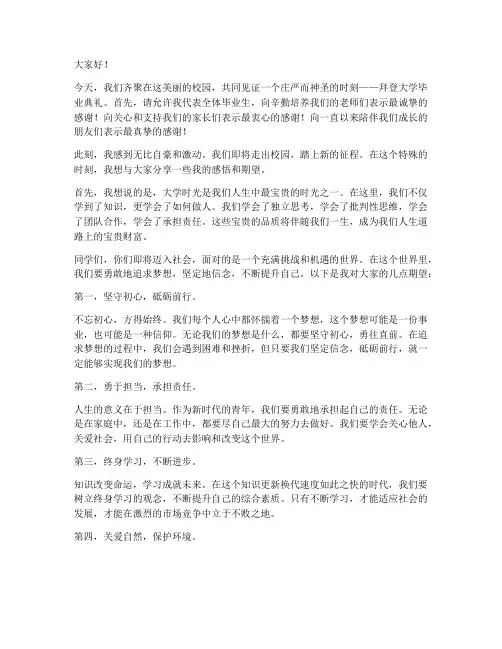
大家好!今天,我们齐聚在这美丽的校园,共同见证一个庄严而神圣的时刻——拜登大学毕业典礼。
首先,请允许我代表全体毕业生,向辛勤培养我们的老师们表示最诚挚的感谢!向关心和支持我们的家长们表示最衷心的感谢!向一直以来陪伴我们成长的朋友们表示最真挚的感谢!此刻,我感到无比自豪和激动。
我们即将走出校园,踏上新的征程。
在这个特殊的时刻,我想与大家分享一些我的感悟和期望。
首先,我想说的是,大学时光是我们人生中最宝贵的时光之一。
在这里,我们不仅学到了知识,更学会了如何做人。
我们学会了独立思考,学会了批判性思维,学会了团队合作,学会了承担责任。
这些宝贵的品质将伴随我们一生,成为我们人生道路上的宝贵财富。
同学们,你们即将迈入社会,面对的是一个充满挑战和机遇的世界。
在这个世界里,我们要勇敢地追求梦想,坚定地信念,不断提升自己。
以下是我对大家的几点期望:第一,坚守初心,砥砺前行。
不忘初心,方得始终。
我们每个人心中都怀揣着一个梦想,这个梦想可能是一份事业,也可能是一种信仰。
无论我们的梦想是什么,都要坚守初心,勇往直前。
在追求梦想的过程中,我们会遇到困难和挫折,但只要我们坚定信念,砥砺前行,就一定能够实现我们的梦想。
第二,勇于担当,承担责任。
人生的意义在于担当。
作为新时代的青年,我们要勇敢地承担起自己的责任。
无论是在家庭中,还是在工作中,都要尽自己最大的努力去做好。
我们要学会关心他人,关爱社会,用自己的行动去影响和改变这个世界。
第三,终身学习,不断进步。
知识改变命运,学习成就未来。
在这个知识更新换代速度如此之快的时代,我们要树立终身学习的观念,不断提升自己的综合素质。
只有不断学习,才能适应社会的发展,才能在激烈的市场竞争中立于不败之地。
第四,关爱自然,保护环境。
地球是我们共同的家园,保护环境就是保护我们自己。
我们要关爱自然,尊重生命,积极参与环保行动。
从自身做起,从小事做起,为地球的可持续发展贡献自己的力量。
第五,传承文化,弘扬民族精神。
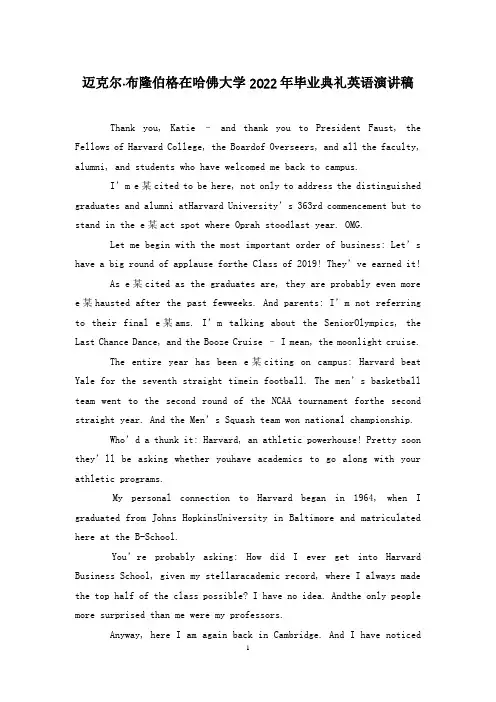
迈克尔·布隆伯格在哈佛大学2022年毕业典礼英语演讲稿Thank you, Katie –and thank you to President Faust, the Fellows of Harvard College, the Boardof Overseers, and all the faculty, alumni, and students who have welcomed me back to campus.I’m e某cited to be here, not only to address the distinguished graduates and alumni atHarvard University’s 363rd commencement but to stand in the e某act spot where Oprah stoodlast year. OMG.Let me begin with the most important order of business: Let’s have a big round of applaus e forthe Class of 2019! They’ve earned it!As e某cited as the graduates are, they are probably even more e某hausted after the past fewweeks. And parents: I’m not referring to their final e某ams. I’m talking about the SeniorOlympics, the Last Chance Dance, and the Booze Cruise –I mean, the moonlight cruise.The entire year has been e某citing on campus: Harvard beat Yale for the seventh straight timein football. The men’s basketball team went to the second round of the NCAA tournament forthe second s traight year. And the Men’s Squash team won national championship.Who’d a thunk it: Harvard, an athletic powerhouse! Pretty soon they’ll be asking whether youhave academics to go along with your athletic programs.My personal connection to Harvard began in 1964, when I graduated from Johns HopkinsUniversity in Baltimore and matriculated here at the B-School.You’re probably asking: How did I ever get into Harvard Business School, given my stellaracademic record, where I always made the top half of the class possible? I have no idea. Andthe only people more surprised than me were my professors.Anyway, here I am again back in Cambridge. And I have noticedthat a few things havechanged since I was a student here. Elsie’s –a sandwich spot I used to love near the Square –is now a burrito shop. The Wursthaus –which had great beer and sausage –is now an artisanalgastro-pub, whatever the heck that is. And the old Holyoke Center is now named the SmithCampus Center.Don’t you just hat e it when alumni put their names all over everything? I was thinking aboutthat this morning as I walked into the Bloomberg Center on the Harvard Business Schoolcampus across the river.But the good news is, Harvard remains what it was when I first ar rived on campus 50 yearsago: America’s most prestigious university. And, like other great universities, it lies at theheart of the American e某periment in democracy.Their purpose is not only to advance knowledge, but to advance the ideals of our nation. Greatuniversities are places where people of all backgrounds, holding all beliefs, pursuing allquestions, can come to study and debate their ideas – freely and openly.Today, I’d like to talk with you about how important it is for that freedom to e某ist for everyone,no matter how strongly we may disagree with another’s viewpoint.Tolerance for other people’s ideas, and the freedom to e某press your own, are inseparable valuesat great universities. Joined together, they form a sacred trust that holds the basis of ourdemocratic society.But that trust is perpetually vulnerable to the tyrannical tendencies of monarchs, mobs, andmajorities. And lately, we have seen those tendencies manifest themselves too often, both oncollege campuses and in our society.That’s the bad news – and unfortunately, I think both Harvard, and my own city of New York,have been witnesses to this trend.First, for New York City. Several years ago, as you may remember, some people tried to stopthe development of a mosque a few blocks from the World Trade Center site.It was an emotional issue, and polls showed that two-thirds of Americans were against amosque being built there. Even the Anti-Defamation League –widely regarded as the country’smost arden t defender of religious freedom – declared its opposition to the project.The opponents held rallies and demonstrations. They denounced the developers. And theydemanded that city government stop its construction. That was their right – and we protectedtheir right to protest. But they could not have been more wrong. And we refused to cave in totheir demands.The idea that government would single out a particular religion, and block its believers – andonly its believers – from building a house of worship in a particular area is diametricallyopposed to the moral principles that gave rise to our great nation and the constitutionalprotections that have sustained it.Our union of 50 states rests on the union of two values: freedom and tolerance. And it is thatunion of values that the terrorists who attacked us on September 11th, 2019 – and on April15th, 2019 – found most threatening.To them, we were a God-less country.But in fact, there is no country that protects the core of every faith and philosophy known tohuman kind – free will – more than the United States of America. That protection, however,rests upon our constant vigilance.We like to think that the principle of separation of church and state is settled. It is not. And itnever will be. It is up to us to guard it fiercely – and to ensure that equality under the lawmeansequality under the law for everyone.If you want the freedom to worship as you wish, to speak as you wish, and to marry whom youwish, you must tolerate my freedom to do so – or not do so – as well.What I do may offend you. You may find my actions immoral or unjust. But attempting torestrict my freedoms – in ways that you would not restrict your own – leads only to injustice.We cannot deny others the rights and privileges that we demand for ourselves. And that is truein cities – and it is no less true at universities, where the forces of repression appear to bestronger now than they have been since the 1950s.When I was growing up, U.S. Senator Joe McCarthy was asking: ‘Are you now or have you everbeen?’ He was attempting to repress and criminalize those who sympathized with an economicsystem that was, even then, failing.McCarthy’s Red Scare destroyed thousands of lives, but wh at was he so afraid of? An idea – inthis case, communism – that he and others deemed dangerous.But he was right about one thing: Ideas can be dangerous. They can change society. They canupend traditions. They can start revolutions. That’s why throug hout history, those in authorityhave tried to repress ideas that threaten their power, their religion, their ideology, or theirreelection chances.That was true for Socrates and Galileo, it was true for Nelson Mandela and Václav Havel, and ithas been true for Ai Wei Wei, Pussy Riot, and the kids who made the ‘Happy’ video in Iran.Repressing free e某pression is a natural human weakness, and it is up to us to fight it at everyturn. Intolerance of ideas – whether liberal or conservative – is antithetical to individualrights and freesocieties, and it is no less antithetical to great universities and first-ratescholarship.There is an idea floating around college campuses – including here at Harvard – that scholarsshould be funded only if their work conforms to a particular view of justice. There’s a word forthat idea: censorship. And it is just a modern-day form of McCarthyism.Think about the irony: In the 1950s, the right wing was attempting to repress left wing ideas.Today, on many college campuses, it is liberals trying to repress conservative ideas, even asconservative faculty members are at risk of becoming an endangered species. And perhapsnowhere is that more true than here in the Ivy League.In the 2019 presidential race, according to Federal Election Commission data, 96 percent of allcampaign contributions from Ivy League faculty and employees went to Barack Obama.Ninety-si某 percent. There was more disagreement among the old Soviet Politburo than there isamong Ivy League donors.That statistic should give us pause – and I say that as someone who endorsed President Obamafor reelection – because let me tell you, neither party has a monopoly on truth or God on itsside.When 96 percent of Ivy League donors prefer one candidate to another, you have to wonderwhether students are being e某posed to the diversity of views that a great university shouldoffer.Diversity of gender, ethnicity, and orientation is important. But a university cannot be great ifits faculty is politically homogenous. In fact, the whole purpose of granting tenure to professorsis to ensure that they feel free to conduct research on ideas that run afoul of university politicsand societal norms.When tenure was created, it mostly protected liberals whoseideas ran up against conservativenorms.Today, if tenure is going to continue to e某ist, it must also protect conservatives whose ideasrun up against liberal norms. Otherwise, university research – and the professors who conductit –will lose credibility.Great universities must not become predictably partisan. And a liberal arts education mustnot be an education in the art of liberalism.The role of universities is not to promote an ideology. It is to provide scholars and studentswith a neutral forum for researching and debating issues – without tipping the scales in onedirection, or repressing unpopular views.Requiring scholars – and commencement speakers, for that matter –to conform to certainpolitical standards undermines the whole purpose of a university.This spring, it has been disturbing to see a number of college commencement speakerswithdraw – or have their invitations rescinded – after protests from students and – to me,shockingly – from senior faculty and administrators who should know better.It happened at Brandeis, Haverford, Rutgers, and Smith. Last year, it happened at Swarthmoreand Johns Hopkins, I’m sorry to say.In each case, liberals silenced a voice –and denied an honorary degree – to individuals theydeemed politically objectionable. That is an outrage and we must not let it continue.If a university thinks twice before inviting a commencement speaker because of his or herpolitics censorship and conformity – the mortal enemies of freedom – win out.And sadly, it is not just commencement season when speakers are censored.Last fall, when I was still in City Hall, our PoliceCommissioner was invited to deliver a lecture atanother Ivy League institution –but he was unable to do so because students shouted himdown.Isn’t the purpose of a university to stir discussion, not silence it? What were the studentsafraid of hearing? Why did administrators not step in to prevent the mob from silencingspeech? And did anyone consider that it is morally and pedagogically wrong to deprive otherstudents the chance to hear the speech?I’m sure all of today’s graduates have read John Stuart Mill’s On Liberty. But allow me to read ashort passage from it: ‘The peculiar evil of silencing the e某pression of an opinion is, that it isrobbing the human race; posterity as well as the e某isting generation; those who dissent fromthe opinion, still more than those who hold it.’ He continued: ‘If the opinion is right, they are de prived of the opportunity of e某changingerror for truth: if wrong, they lose, what is almost as great a benefit, the clearer perceptionand livelier impression of truth, produced by its collision with error.’ Mill would have been horrified to learn of university students silencing the opinions of others. Hewould have been even more horrified that faculty members were often part of thecommencement censorship campaigns.For tenured faculty members to silence speakers whose views they disagree with is the heightof hypocrisy, especially when these protests happen in the northeast – a bastion of self-professed liberal tolerance.I’m glad to say, however, that Harvard has not caved in to these commencement censorshipcampaigns. If it had, Colorado State Senator Michael Johnston would not have had the chanceto address the Education School yesterday.Some students called on the administration to rescind the invitation to Johnston becausethey opposed some of his education policies. But to their great credit, President Faust andDean Ryan stood firm.As Dean Ryan wrote to students: ‘I have encountered many people of good faith who share mybasic goals but disagree with my own views when it comes to the question of how best toimprove education. In my view, those differences should be e某plored, debated, challenged, andquestioned. But they should also be respected and, indeed, celebrated.’He could not have been more correct, and he could not have provided a more valuable finallesson to the class of 2019.As a former chairman of Johns Hopkins, I strongly believe that a university’s obligation is notto teach students what to think but to teach students how to think. And that requires listeningto the other side, weighing arguments without prejudging them, and determining whether theother side might actually make some fair points.If the faculty fails to do this, then it is the responsibility of the administration and governingbody to step in and make it a priority. If they do not, if students graduate with ears and mindsclosed, the university has failed both the student and society.And if you want to know where that leads, look no further than Washington, D.C.Down in Washington, every major question facing our country –involving our security, oureconomy, our environment, and our health –is decided.Yet the two parties decide these questions not by engaging with one another, but by trying toshout each other down, and by trying to repress and undermine research that runs counterto their ideology. Themore our universities emulate that model, the worse off we will be as asociety.And let me give you an e某ample: For decades, Congress has barred the Centers for DiseaseControl from conducting studies of gun violence, and recently Congress also placed thatprohibition on the National Institute of Health. You have to ask yourself: What are they afraidof?This year, the Senate has delayed a vote on President Obama’s nominee for Surgeon General –Dr. Vivek Murthy, a Harvard physician –because he had the audacity to say that gunviolence is a public health crisis that should be tackled. The gall of him!Let’s get serious: When 86 Americans are killed with guns every single day, and shootingsregularly occur at our schools and universities –including last week’s tragedy at Santa Barbara– it would be almost medical malpractice to say anything else.But in politics –as it is on too many college campuses –people don’t listen to facts that runcounter to their id eology. They fear them. And nothing is more frightening to them thanscientific evidence.Earlier this year, the State of South Carolina adopted new science standards for its publicschools – but the state legislature blocked any mention of natural sel ection. That’s liketeaching economics – without mentioning supply and demand.Again, you have to ask: What are they afraid of?The answer, of course, is obvious: Just as members of Congress fear data that underminestheir ideological beliefs, these state legislators fear scientific evidence that undermines theirreligious beliefs.And if you want proof of that, consider this: An 8-year oldgirl in South Carolina wrote tomembers of the state legislature urging them to make the Woolly Mammoth the official statefossil. The legislators thought it was a great idea, because a Woolly Mammoth fossil was foundin the state way back in 1725. But the state senate passed a bill defining the Woolly Mammothas having been ‘created on the 6th day with the bea sts of the field.’You can’t make this stuff up.Here in 21st century America, the wall between church and state remains under attack –andit’s up to all of us to man the barricades.Unfortunately, the same elected officials who put ideology and religion over data and sciencewhen it comes to guns and evolution are often the most unwilling to accept the scientificdata on climate change.Now, don’t get me wrong: scientific skepticism is healthy. But there is a world of differencebetween scientific skepticism that seeks out more evidence and ideological stubbornness thatshuts it out.Given the general attitude of many elected officials toward science it’s no wonder that thefederal government has abdicated its responsibility to invest in scientific research, much ofwhich occurs at our universities.Today, federal spending on research and development as a percentage of GDP is lower than ithas been in more than 50 years whichis allowing the rest of the world to catch up – and evensurpass –the U.S. in scientific research.The federal government is flunking science, just as many state governments are.We must not become a country that turns our back on science, or on each other. And yougraduates must help lead the way.On every issue, we must follow the evidence where it leads and listen to people where theyare. If we do that, there is no problem wecannot solve. No gridlock we cannot break. Nocompromise we cannot broker.The more we embrace a free e某change of ideas, and the more we accept that politicaldiversity is healthy, the stronger our society will be.Now, I know this has not been a traditional commencement speech, and it may keep mefrom passing a dissertation defense in the humanities department, but there is no easy timeto say hard things.Graduates: Throughout your lives, do not be afraid of saying what you believe is right, nomatter how unpopular it may be, especially when it comes to defending the rights of others.Standing up for the rights of others is in some ways even more important than standing up foryour own rights. Because when people seek to repress freedom for some, and you remainsilent, you are complicit in that repression and you may well become its victim.Do not be complicit, and do not follow the crowd. Speak up, and fight back.You will take your lumps, I can assure you of that. You will lose some friends and make someenemies. But the arc of history will be on your side, and our nation will be stronger for it.Now, all of you graduates have earned today’s celebration, and you have a lot to be proud ofand a lot to be grateful for. So tonight, as you leave this great university behind, have one lastScorpion Bowl at the Kong –on second thought, don’t – and tomorrow, get to work making ourcountry and our world freer than ever, for everyone.Good luck and God bless.11。
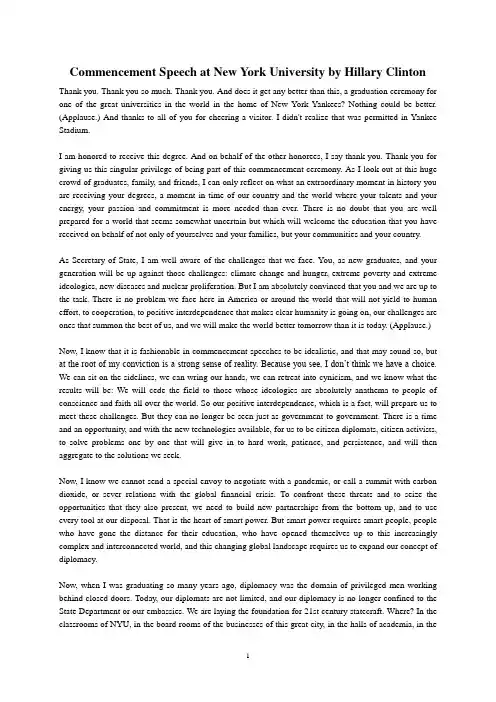
Commencement Speech at New York University by Hillary ClintonThank you. Thank you so much. Thank you. And does it get any better than this, a graduation ceremony for one of the great universities in the world in the home of New York Yankees? Nothing could be better. (Applause.) And thanks to all of you for cheering a visitor. I didn't realize that was permitted in Yankee Stadium.I am honored to receive this degree. And on behalf of the other honorees, I say thank you. Thank you for giving us this singular privilege of being part of this commencement ceremony. As I look out at this huge crowd of graduates, family, and friends, I can only reflect on what an extraordinary moment in history you are receiving your degrees, a moment in time of our country and the world where your talents and your energy, your passion and commitment is more needed than ever. There is no doubt that you are well prepared for a world that seems somewhat uncertain but which will welcome the education that you have received on behalf of not only of yourselves and your families, but your communities and your country.As Secretary of State, I am well aware of the challenges that we face. You, as new graduates, and your generation will be up against those challenges: climate change and hunger, extreme poverty and extreme ideologies, new diseases and nuclear proliferation. But I am absolutely convinced that you and we are up to the task. There is no problem we face here in America or around the world that will not yield to human effort, to cooperation, to positive interdependence that makes clear humanity is going on, our challenges are ones that summon the best of us, and we will make the world better tomorrow than it is today. (Applause.)Now, I know that it is fashionable in commencement speeches to be idealistic, and that may sound so, but at the root of my conviction is a strong sense of reality. Because you see, I don’t think we have a choice. We can sit on the sidelines, we can wring our hands, we can retreat into cynicism, and we know what the results will be: We will cede the field to those whose ideologies are absolutely anathema to people of conscience and faith all over the world. So our positive interdependence, which is a fact, will prepare us to meet these challenges. But they can no longer be seen just as government-to-government. There is a time and an opportunity, and with the new technologies available, for us to be citizen diplomats, citizen activists, to solve problems one by one that will give in to hard work, patience, and persistence, and will then aggregate to the solutions we seek.Now, I know we cannot send a special envoy to negotiate with a pandemic, or call a summit with carbon dioxide, or sever relations with the global financial crisis. To confront these threats and to seize the opportunities that they also present, we need to build new partnerships from the bottom up, and to use every tool at our disposal. That is the heart of smart power. But smart power requires smart people, people who have gone the distance for their education, who have opened themselves up to this increasingly complex and interconnected world, and this changing global landscape requires us to expand our concept of diplomacy.Now, when I was graduating so many years ago, diplomacy was the domain of privileged men working behind closed doors. Today, our diplomats are not limited, and our diplomacy is no longer confined to the State Department or our embassies. We are laying the foundation for 21st century statecraft. Where? In the classrooms of NYU, in the board rooms of the businesses of this great city, in the halls of academia, in theoperating rooms of our great hospitals. We are looking for those personal commitments and connections, and that is where all of you come in.The biggest chal lenges we face today will be solved by the 60 percent of the world’s population under the age of 30. And already, young people, like all of you, are using their talents and ingenuity to help fashion their own brand of service and diplomacy.A few examples: In the nation of Colombia, two young college graduates, fed up with the violence in their country, used Facebook to organize 14 million people into the largest antiterrorism demonstrations in the history of the world. (Applause.) In a few short weeks, their peaceful efforts did as much damage to the terrorist networks as years of military action.I know that one of your graduates spent months on the slopes of Mount Kilimanjaro searching for sustainable development models to bring to women and families and help them lift themselves out of poverty. Another of your classmates was studying in China last year when the devastating earthquake struck, and that has led to work ever since to deliver supplies and assistance to villagers in remote areas. International students have gone on to fight for human rights in Rwanda, build civil society in the nation of Georgia, run businesses, and lead governments. And many of you, I know, used social networking platforms to make Barack Obama the President of the United States of America. (Applause.)President Obama and I deeply understand how important it is for the young people of our country, but the young people of every country, to be given the opportunity to translate your beliefs and ideals into service and action, just as John Kennedy did when he created the Peace Corps and as President Bill Clinton did when he created AmeriCorps. This is in the tradition of citizen service. (Applause.)So we need to figure out ways to prepare all of our institutions of government, including and especially the State Department, to harness the efforts of those who do not enter the Foreign Service but still engage in your own type of foreign service. Our State Department personnel are skilled, dedicated, passionate, and effective. And for those of you still looking for jobs, we are hiring a new generation of diplomats. (Applause.)I hope many of you will join our ranks in the Foreign Service and the Civil Service, but I know that not all will choose to become professional diplomats, and I also know that the State Department alone cannot tackle these great problems. So my message to you today is this: Be the special envoys of your ideals; use the communication tools at your disposal to advance the interests of our nation and humanity everywhere; be citizen ambassadors using your personal and professional lives to forge global partnerships, build on a common commitment to solving our planet’s common problems. By creating your own networks, you can extend the power of governments to meet the needs of this and future generations. You can help lay the groundwork for the kind of global cooperation that is essential if we wish, in our time, to end hunger and defeat disease, to combat climate change, and to give every child the chance to live up to his or her God-given potential. (Applause.)This starts with opportunities for educational exchanges, the kind of dorm room and classroom diplomacy that NYU is leading on. I want to commend my friend, your president, the trustees of this great university,for understanding and believing in the importance of educational exchanges.You know, study abroad is like spring training for this century. It helps you develop the fundamentals, the teamwork, and the determination to succeed. And we want more American students to have that opportunity. That’s why we are increasing funding for Gilman scholarships by more than 40 percent. More than 400 New Yorkers have used Gilman scholarships to spend a semester abroad, including nine students from NYU last year.Now, of course, study abroad is a two-way street, and we should bring more qualified students from other countries to study here. NYU provides a prime example of what international students can bring to a campus and how they can benefit themselves and their countries. Over 700,000 international students came to the United States last year, and NYU had the second largest number of any school in the country. (Applause.)Now, the benefits from such exchanges are so great that I am committed to streamline the visa process –(applause) – particularly for science and technology students so that even more qualified students will come to our campuses in the future. We’re also doing more to marry technology with global service. That’s why today I am pleased to announce that over the next year the State Department will be creating Virtual Student Foreign Service Internships to harness the energy of a rising generation of citizen diplomats. Working from college and university campuses, American students will partner with our embassies abroad to conduct digital diplomacy that reflects the realities of the networked world. And you can learn more about this initiative on the State Department’s website.But I know that you don’t have to wait for us to create a new program. Whe n you go home today, go online and find the website called Kiva, K-i-v-a, where you can help someone like San Ma, a mother in Vietnam who is seeking a microcredit loan to buy rice seed and fertilizer for her family farm; or log on to Heifer International’s site, and for less than the cost of a dinner out, you can donate a flock of geese to a hungry family in Asia or Africa; or help Wangari Mathai’s Green Belt movement in planting trees and offsetting carbon emissions and empowering women in Africa.Now, supporting these projects and others like them doesn't require a lot of time or money. But for the people you help and the planet you protect, your participation can be not just a game changer, but a life changer. Global service also means promoting good governance. We need informed citizens, both here at home and around the world, to hold their governments accountable for getting results and finding solutions.And this is not only directed at the graduates today, but there are a lot of proud mothers and fathers and husbands and wives and grandparents and children and others who have seen you to this day. And this is an offer and a challenge to all of us. In the times that we face, we know we don’t have a person to waste, we don’t have an idea to overlook. In fact, we have to be even more committed to reaching out and crossing the divides that too often separate us. For those who have come to this country to celebrate a child or a friend’s graduation, please take home this message: America more than ever wants your help; in fact, needs your help as we build these new partnerships and as we seek solutions to the global crises that cannot be solved by any one people or one government alone.We need each other. We always have. It’s just so much more apparent toda y. A flu starting in one country spreads quickly around the world. An extremist ideology starting with a few people explodes across the internet. A global financial crisis affects farmers and small business people in every corner of the globe. That is a new reality. But equally important is that we also now have the tools to work together to forge this common approach to these common threats.So, Class of 2009, you have an historic opportunity. Every class is told that, and to some extent I suppose it is a lways true. But just in the course of this commencement ceremony, you’ve heard several references to the global economic crisis. The times that you are graduating in are, yes, perhaps more difficult and somewhat more daunting. But that’s when we really ris e together. One of the best lines from one of my favorite baseball movies, A League of Their Own –(applause) –said it well, “If it were easy, anybody could do it.”You know, when the Yankees moved in to their old stadium next door in 1923, there was only person on the roster from west of St. Louis. Their team mostly looked the same, talked the same, and came from the same kind of cities and towns and rural areas across America. Think about the team that plays in this new stadium. It includes players from Mexico, Japan, Taiwan, Panama, four other countries. The Dominican Republic alone is home to seven Yankees. In the same way, NYU has evolved as well. The university was founded to serve the City of New York. Today it serves the world.We know that there is much yet ahead that none of us can predict. There is no way to stop change. Change will come. What is unknown is whether it will bring progress or not. But you have done what you needed to do to get the best insurance policy you could, and that is an NYU education. (Applause.) And so armed with that education, I have every confidence that you will not only succeed by the dint of your own hard work and effort, but you will contribute far beyond your own personal needs. This is your moment. You’ve made it to the big leagues, and you are up to bat. Go out and give us a future worthy of this great university, of this great city, of this great country, and of the world we all wish to create together.Thank you, congratulations, and Godspeed. (Applause.)。
大家好!今天,我非常荣幸能够站在这里,作为泰勒纽约大学的毕业生,发表我的毕业演讲。
首先,请允许我向在座的每一位辛勤付出、陪伴我们走过这段宝贵时光的老师们表示最诚挚的感谢!同时,也要感谢我的家人、朋友和同学们,是你们的支持和鼓励让我有了勇气面对未来的挑战。
时光荏苒,转眼间我们已从青涩的少年成长为即将踏入社会的青年。
在纽约大学这个充满活力、包容和创新的学术殿堂里,我们度过了充实而难忘的四年。
今天,我将与大家分享我的成长历程、感悟以及未来展望。
首先,我要感谢纽约大学为我们提供了一个多元、包容的学术环境。
在这里,我们接触到了来自世界各地的优秀人才,他们来自不同的文化背景、有着不同的价值观和人生观。
正是这种多元文化的碰撞,让我们拓宽了视野,学会了尊重和理解他人。
我相信,这种包容和尊重的精神将伴随我们一生,成为我们面对未来挑战的重要力量。
在纽约大学的四年里,我深刻体会到了“终身学习”的重要性。
面对日新月异的社会发展,我们必须保持好奇心和求知欲,不断学习新知识、新技能,以适应这个快速变化的世界。
在这里,我们不仅学到了专业知识,更重要的是学会了如何学习,如何独立思考,如何解决问题。
这些能力将成为我们未来事业成功的基石。
此外,纽约大学还教会了我团队合作的重要性。
在团队合作中,我们学会了倾听、沟通、协作和承担责任。
这些经验对于我们未来的职业生涯具有重要意义。
我相信,在未来的工作和生活中,我们将面临各种挑战和困难,而团队合作将成为我们克服这些困难、实现共同目标的关键。
在此,我要特别感谢我的导师们。
他们不仅传授给我们知识,更给予我们无尽的关爱和鼓励。
在他们的指导下,我们逐渐成长为有担当、有责任感的社会人。
在此,我要向所有导师们致以崇高的敬意!同学们,时光荏苒,我们即将踏上人生的新征程。
面对未来,我们既充满期待,又有些许忐忑。
但请相信,只要我们坚定信念、勇往直前,就一定能够战胜一切困难,实现自己的人生目标。
首先,我们要树立正确的人生观和价值观。
美国毕业典礼致辞4篇美国毕业典礼致辞篇1尊敬的学校领导、老师亲爱的同学,兄弟姐妹们!大家下午好!我很荣幸作为一名学生代表在毕业典礼上发言,此时此刻我心里面是无比的激动,因为我将要离开培养我关心我的母校,将要和一起学会成长的在座朋友们分开。
光阴似箭,四年过去了,在这段时间里我学会了很多很多,学会了怎样去学习,学会了怎样去做人,学会了怎样去奉献。
正是由于母校给我这样的机会去锻炼,如今才让我获得了人生中第一次成功找到了一份满意的工作,在此我请允许我介绍一下如何去赢得公司的信赖,如何赢得他人的尊重。
有人说如今找工作难,找到好工作更难!的确,现实的情况就是这样,参加过就业招聘会的人都知道,现在大学生真是太多了!但是你有没有想过,大学生多仅仅是一个方面,工作岗位还是很多,尤其我们江苏地区,最主要的原因还是不够优秀,如果每个人都是用最严格的标准来要求自己,真正在大学里面掌握文化知识,学会了为人的道理,学会了理性去思考问题,怎么可能会找不到工作了!我想这句话是很重要的“没有人会知道你有多大能耐,只有靠自己去证明给别人看”就这些方面结合我个人想法主要从以下几点来谈:第一、要树立自信的心理。
当然自信的背后也要有自己的汗水,要打有准备之仗,我相信上天总是将辛运之神降临到辛勤劳动的人。
在我出去找工作的过程当中,也遇到了不少的困难,但是你要相信这句话,“天生我才必有用”在很多人心理总是有这样的阴影,认为我自己现在的双重身份会不会引起用人单位的怀疑,会不会招受到用人单位的冷遇,会不吃闭门羹,这种心理我想人人都会有,但是从我过来人来看,现在用人单位看重学校的越来越少,关键是你是否有这个能力能够打动面试的考官,有没有这个能力一下子让面试官对你有印象!在单位实习过程当中,我代表_出去参加了七场招聘会,当然从被面试者转变为面试官当时还有种不太适应的感觉,但是我清楚的感受到了这两者之间的差距,那种差距其实就是概括成一句话“态度决定一切”,往往现在的学生都是比较自傲,没有一种虚心的态度,总是认为自己了不起,这种心理千万不能有,要努力踏实让其他人对你的评价是了不起,坦然的面对一切。
Taylor Swift’s NYU Commencement Speech:Read the Full TranscriptTaylor Swift纽约⼤学毕业典礼演讲Hi,I’m Taylor.嗨,我是泰勒。
Last time I was in a stadium this size, I was dancing in heels and wearing a glittery leotard. This outfit is much more comfortable. 上次我在这么⼤的体育场时,我穿着⾼跟鞋跳舞,穿着闪闪发光的紧身⾐。
这套⾐服舒服多了。
I’d like to say a huge thank you to NYU‘s Chairman of the Board of Trustees, Bill Berkeley and all the trustees and members of the board, NYU’s President Andrew Hamilton, Provost Katherine Fleming, and the faculty and alumni here today who have made this day possible. I feel so proud to share this day with my fellow honorees Susan Hockfield and Felix Matos Rodriguez, who humble me with the ways they improve our world with their work. As for me, I’m…90% sure the main reason I’m here is because I have a song called ‘22’. And let me just say, I am elated to be here with you today as we celebrate and graduate New York University’s Class of 2022. 我要向纽约⼤学董事会主席⽐尔·伯克利和所有董事会成员、纽约⼤学校长安德鲁·汉密尔顿、教务长凯瑟琳·弗莱明以及今天在座的教职员⼯和校友表⽰衷⼼的感谢。
美国三大名校毕业演讲稿在这个隆重的毕业季,站在这里,我感到无比荣幸和激动。
首先,我要恭喜各位即将毕业的同学们,你们即将踏上新的征程,迎接人生的新挑战。
同时,我也要感谢美国三大名校给予我们这次难得的机会,让我们有机会站在这里,分享我们的心声和感悟。
毕业季,是一个充满感动和回忆的时刻。
在这个特殊的时刻,我想和大家分享一些关于美国三大名校的毕业演讲稿。
这些毕业演讲,不仅代表了毕业生们的心声,也代表了这些名校的精神和理念。
首先,我想分享的是哈佛大学的毕业演讲。
哈佛大学作为美国顶尖的名校之一,其毕业演讲自然也是备受瞩目的。
在一次毕业典礼上,哈佛大学的毕业生们听到了来自奥普拉·温弗瑞的激励和鼓舞。
她在演讲中提到,“每个人都有能力去改变世界,每个人都有责任去做出贡献。
”这句话深深触动了在场的每一个人,也激励着他们走向人生的下一个阶段。
接下来,让我们来听一听耶鲁大学的毕业演讲。
耶鲁大学一直以其开放包容的精神和追求卓越的理念而闻名。
在一次毕业典礼上,史蒂夫·乔布斯曾经发表过一场令人难忘的演讲。
他说,“要相信自己的选择,不要被别人的观点左右,要有勇气追随自己的内心。
”这番话语简洁明了,却道出了耶鲁大学一直倡导的独立思考和勇于创新的精神。
最后,让我们来聆听斯坦福大学的毕业演讲。
斯坦福大学一直以其创新精神和实践能力而著称。
在一次毕业典礼上,乔·拜登曾经说过,“要有勇气去追求自己的梦想,不要害怕失败,因为失败是成功的垫脚石。
”这番话语鼓舞了在场的每一个毕业生,也展现了斯坦福大学一贯的积极进取和勇往直前的精神。
在这些毕业演讲中,我们不仅可以感受到名校的精神和理念,更可以从中汲取力量和启示。
无论是哈佛大学的责任担当,耶鲁大学的独立思考,还是斯坦福大学的勇往直前,这些都是我们在人生道路上可以借鉴和学习的宝贵财富。
在即将踏上新的人生征程之际,让我们铭记这些毕业演讲中的精神和理念,勇敢地追求自己的梦想,勇敢地面对人生的挑战,勇敢地走出自己的风采。
乔布斯在斯坦福大学毕业典礼上的演讲稿( 中英文对照)篇一:乔布斯斯坦福大学毕业典礼演讲稿【中英】乔布斯XX年斯坦福演讲:活出你自己XX年6 月12 日,在美国斯坦福大学毕业典礼上,苹果公司CEO史蒂夫?乔布斯( Steve Jobs )发表了精彩演讲。
已被确诊身患癌症的乔布斯对在场学子讲述了自己经历的三个故事,与学子们分享自己的创业心得,并以此激励年轻一代勇敢、积极、快乐地面对人生。
这三次体验不仅在斯坦福大学的毕业生、也在硅谷乃至其他地方的技术同行中引起了巨大反响。
尤其The Whole Earth Catalog 提到的话,作为杂志,这是一种精神,一种气质。
乔布斯对操场上挤的满满的毕业生、校友和家长们说:“你的时间有限,所以最好别把它浪费在模仿别人这种事上。
” --同样地,如果还在学校的话,似乎不应该去模仿退学的牛人们。
乔布斯朴实而真诚的演讲不但赢得了全场数次热烈鼓掌和尖叫,也成为近年美国毕业典礼演讲中最具影响力的一篇。
时至今日,这一演讲仍然对广大学子和创业者产生着深远影响。
以下为乔布斯在斯坦福大学毕业典礼上的演讲全文:史蒂夫·乔布斯(Steve Jobs) 在斯坦福大学XX 年毕业典礼上的演讲稿[ 中英对照]XX-10-06 21:04:19You've got to find what you love,' Jobs saysJobs 说,你必须要找到你所爱的东西。
This is the text of the Commencement address by Steve Jobs, CEOo f Apple Computer and of Pixar Animation Studios, delivered on June 12, XX.这是苹果公司和Pixar 动画工作室的CEOS teve Jobs 于XX年6 月12 号在斯坦福大学的毕业典礼上面的演讲稿。
Thank you.I am honored to be with you today at your commencementf rom one of the finest universities in the world. I never graduated from college. Truth be told, this is the closest I've ever gotten to a college graduation. Today I want to tell you three stories from my life. That's it. No big deal. Just three stories.我今天很荣幸能和你们一起参加毕业典礼,斯坦福大学是世界上最好的大学之一。
纽约大学校长毕业典礼致辞3篇纽约大学校长毕业典礼致辞篇1尊敬的各位领导、各位老师、各位同学:大家好!我是x级2班的争气的败家子,非常荣幸代表我们班48名毕业生发言。
四年过去了,学校的学习和生活为我们奠定了坚实的基础,明天我们就要离开曾经憧憬向往的大学生涯,走向我们的最终归宿——社会。
服务社会才是我们的最终目标,我们会投身在社会的大课堂中不断进步,在社会的大舞台上大展鸿图。
再此,我代表我们班的全体毕业生,感谢母校四年来对我们的培养和教育,感谢各位领导和老师对我们的关爱和教诲,感谢家人对我们的付出和鼓励,感谢身边朋友带给我们的快乐和帮助。
毕业,就像一个大大的句号。
从此,我们告别了一段纯真的青春,一段年少轻狂的岁月,一个充满幻想的时代……毕业前的这些日子,时间过的好像流沙,想挽留,一伸手,有限的时光却在指间悄然溜走,毕业答辩,散伙席筵,举手话别,各奔东西……一切似乎都预想的到,一切又走的太过无奈。
还记得入学第一天我们的自我介绍么还记得为次日的比赛挑灯做准备么还记得我们一起逛街,一起喝酒,一起聊天,一起唱歌么自习室、野游、考试、获奖……一幕幕的场景就像一张张绚烂的剪贴画,串连成一部即将谢幕的电影,播放着我们的快乐和忧伤,记录着我们的青春和过往,也见证着我们的情深义重。
从大一开始第一次上讲台的激动,第一次加入社团的好奇,第一次考试的紧张……到此时在为工作各种选择里彷徨,每一个人都忙忙碌碌,一切仿佛一首没写完的诗,匆匆开始就要匆匆告别。
这些岁月里,大学是我们的资本,也是我们的慰藉。
班级聚餐的时候,所有的同学都在那里举杯,为过去的日子和情感,为将来的分别和感伤。
昔日笑声不断的整个宿舍楼就这样在几天之内变回空楼,变成一个无限伤感的符号。
想起四年以前,我们拎着简单的行李来到这里,而明天,我们重新拎起新的行李,将要开始下一站的生活。
再见了,我的宿舍,再见了,我的兄弟,再见了,我的青春,再见,我的大学。
毕业,又像一个长长的省略号。
美国名校毕业典礼演讲之1. Steve Jobs 史蒂芬·乔布斯CEO of Apple Computers 苹果电脑CEO Stanford University 斯坦福大学June 12, 2005 2005年6月12日Remembering that you are going to die is the best way I know to avoid the trap of thinking you have something to lose. You are already naked. There is no reason not to follow your heart.Your time is limited, so don't waste it living someone else's life. Don't be trapped by dogma —which is living with the results of other people's thinking. Don't let the noise of others' opinions drown out your own inner voice. And most important, have the courage to follow your heart and intuition. They somehow already know what you truly want to become. Everything else is secondary.记着你总会死去,这是我知道的防止患得患失的最佳办法。
赤条条来去无牵挂,还有什么理由不随你的心?你的时间是有限的,因此不要把时间浪费在过别人的生活上。
不要被教条所困——使自己的生活受限于他人的思想成果。
不要让他人的意见淹没了你自己内心的声音。
最重要的是,要有勇气跟随你的内心与直觉,它们好歹已经知道你真正想让自己成为什么。
其他的,都是次要的。
2005年5月21日There are these two young fish swimming along and they happen to meet an older fish swimming the other way, who nods at them and say s, “Morning, boys. How's the water?” And the two young fish swim on for a bit, and then eventually one of them looks over at the other and goes, “What the hell is water?”... simple awareness; awareness of what is so real and essential, so hidden in plain sight all around us, all the time, that we have to keep reminding ourselves over and over: “This is water.”“This is water.”It is unimaginably hard to do this, to stay conscious and alive in the adult world day in and day out.有两条小鱼一起在水里游,碰到一条老鱼迎面游过来。
老鱼向他们点点头,并说:“早上好,孩子们。
水怎么样?”这两条小鱼继续往前游了一会儿后,其中一条小鱼实在忍不住了,看了一下另一条小鱼,问道:“水到底是什么东西?”……简单的意识;对我们生活中如此真实、如此必不可少、无处不在、无时不在的事物的意识,需要我们一遍一遍地提醒自己:“这是水。
”“这是水。
”天天都保持意识清醒而鲜活,在成人世界中做到这点,是不可想象地难。
美国名校毕业典礼演讲之3. Michael Uslan 迈克尔·奥斯兰Movie Producer 电影制片人Indiana University 印第安纳大学May 06, 2006 2006年5月6日You must believe in yourself and in your work. When our first Batman movie broke all those box-office records, I received a phone call from that United Artists exec who, years before, had told me I was out of my mind. Now he said, “Michael, I'm just calling to congratulate you on the success of Batman. I always said you were a visionary.” You see the point here — don't believe them when they tell you how bad you are or how terrible your ideas are, but also, don't believe them when they tell you how wonderful you are and how great your ideas are. Just believe in yourself and you'll do just fine. And, oh yes, don't then forget to market yourself and your ideas. Use both sides of your brain.You must have a high threshold for frustration. Take it from the guy who was turned down by every studio in Hollywood. You must knock on doors until your knuckles bleed. Doors will slam in your face. You must pick yourself up, dust yourself off, and knock again. It's the only way to achieve your goals in life.你必须相信你自己,对自己的工作充满信心。
当我们的第一部电影《蝙蝠侠》创下史无前例的票房纪录时,我接到了艺术家联合会会长的电话,他在数年之前曾说我疯了。
如今他说:“迈克尔,我给你打电话祝贺《蝙蝠侠》的成功。
我总说你是一位有远见的人。
”你看,关键在这里,当他们说你有多差,你的想法有多糟的时候,不要信他们的话,同时,当他们告诉你你有多么了不起,你的想法多美妙时,也不要相信他们。
你就只相信你自己,这样你就能做好。
还有,那就是,不要忘记推销你自己和你的想法。
左右大脑你都得用。
要能经受得住挫败。
这是被好莱坞每一家制片厂拒绝过的人的经验。
你必须去敲一扇扇的门,直到指关节流血。
大门会在你面前砰然关上,你必须重振旗鼓,弹去身上的灰尘,再敲下一扇门。
这是实现你人生目标的唯一办法。
美国名校毕业典礼演讲之4. Woody Hayes 伍迪·海耶斯College Fooball Coach 大学橄榄球教练Ohio State University 俄亥俄州立大学May 14, 1986 1986年5月14日In football we always said that the other team couldn't beat us. We had to be sure that we didn't beat ourselves. And that’s what people have to do, too — make sure they don't beat themselves.... you'll find out that nothing that comes easy is worth a dime. As a matter of fact, I never saw a football player make a tackle with a smile on his face. Never.在橄榄球场上,我们总是说其他队战胜不了我们。
我们必须做到不把自己打垮。
所有人也都必须这么做,确保自己不要被自己打垮。
……你会发现,来得容易的东西总是一文不值。
事实上,我从来没有看到哪位橄榄球运动员是带着微笑完成阻截的。
从来没有。
美国名校毕业典礼演讲之5. Bradley Whitford 布兰德利·惠特福德Actor 演员University Wisconsin - Madison 威斯康辛大学麦迪逊分校May 17, 2006 2006年5月17日Number One: Fall in love with the process and the results will follow.Number Two: Do your work.Number Three: Once you're prepared, throw your preparation in the trash.Number Four: You are capable of more than you think.Number Five: Listen.Number Six: Take action.You have a choice. You can either be a passive victim of circumstance or you can be the active hero of your own life. Action is the antidote to apathy and cynicism and despair.第一,爱上过程,结果自然会来。
第二,做你的事。
第三,一旦准备好,就付诸行动。
第四,你能做的,超出了你的想象。